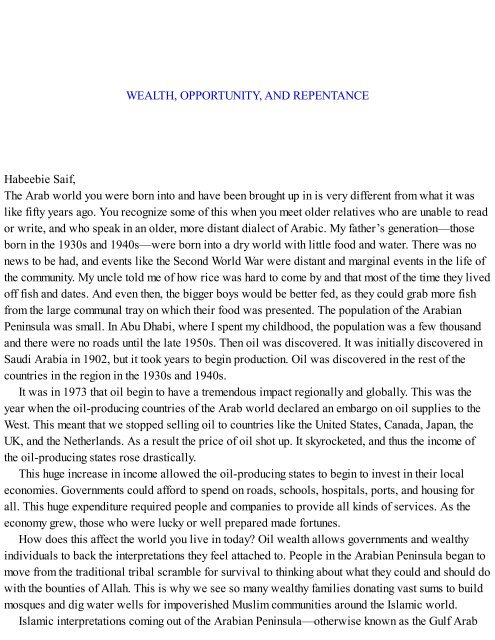1250119847
You also want an ePaper? Increase the reach of your titles
YUMPU automatically turns print PDFs into web optimized ePapers that Google loves.
WEALTH, OPPORTUNITY, AND REPENTANCE<br />
Habeebie Saif,<br />
The Arab world you were born into and have been brought up in is very different from what it was<br />
like fifty years ago. You recognize some of this when you meet older relatives who are unable to read<br />
or write, and who speak in an older, more distant dialect of Arabic. My father’s generation—those<br />
born in the 1930s and 1940s—were born into a dry world with little food and water. There was no<br />
news to be had, and events like the Second World War were distant and marginal events in the life of<br />
the community. My uncle told me of how rice was hard to come by and that most of the time they lived<br />
off fish and dates. And even then, the bigger boys would be better fed, as they could grab more fish<br />
from the large communal tray on which their food was presented. The population of the Arabian<br />
Peninsula was small. In Abu Dhabi, where I spent my childhood, the population was a few thousand<br />
and there were no roads until the late 1950s. Then oil was discovered. It was initially discovered in<br />
Saudi Arabia in 1902, but it took years to begin production. Oil was discovered in the rest of the<br />
countries in the region in the 1930s and 1940s.<br />
It was in 1973 that oil begin to have a tremendous impact regionally and globally. This was the<br />
year when the oil-producing countries of the Arab world declared an embargo on oil supplies to the<br />
West. This meant that we stopped selling oil to countries like the United States, Canada, Japan, the<br />
UK, and the Netherlands. As a result the price of oil shot up. It skyrocketed, and thus the income of<br />
the oil-producing states rose drastically.<br />
This huge increase in income allowed the oil-producing states to begin to invest in their local<br />
economies. Governments could afford to spend on roads, schools, hospitals, ports, and housing for<br />
all. This huge expenditure required people and companies to provide all kinds of services. As the<br />
economy grew, those who were lucky or well prepared made fortunes.<br />
How does this affect the world you live in today? Oil wealth allows governments and wealthy<br />
individuals to back the interpretations they feel attached to. People in the Arabian Peninsula began to<br />
move from the traditional tribal scramble for survival to thinking about what they could and should do<br />
with the bounties of Allah. This is why we see so many wealthy families donating vast sums to build<br />
mosques and dig water wells for impoverished Muslim communities around the Islamic world.<br />
Islamic interpretations coming out of the Arabian Peninsula—otherwise known as the Gulf Arab
















